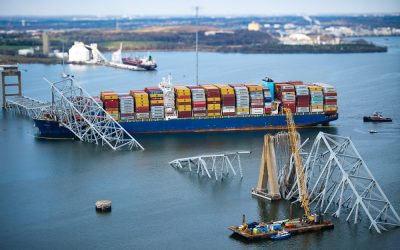September saw the return of the London International Shipping Week (LISW). Now in its tenth year of operation, LISW appears to be maturing into a key waypoint in the global maritime calendar, as was evidenced by this year’s breadth of events, calibre of speakers and record-breaking attendance. With more than 350 events taking place across various venues in London, The Naval Architect’s diligent editorial team certainly burned the shoe leather over the week to get an inside track on a diverse array of topics that are shaping the future of global shipping.
Without doubt, the big-ticket topic of LISW 2023 was decarbonisation. Having had a little time to digest the outcomes of July’s MEPC 80, and after years of uncertainty about how strict the targets would be, the industry seems to be broadly welcoming of the IMO’s revised GHG strategy in ambition to reach net-zero emissions from shipping by 2050. However, despite the generally upbeat nature of the conference streams and panel discussions focused on reducing carbon emissions and adopting eco-friendly practices and technology, conversations on the sidelines did indicate a rising level of scepticism concerning the future targets in general and the 2030 targets in particular; a common thread being serious doubt about the supply and cost of future green fuels.
Away from decarbonisation, several events were concerned with skill development, training, and future skills needed for a changing industry landscape. A takeaway from here was of a skills shortage tsunami due to hit the maritime industry sometime soon. One reason for this is a very obvious negative public perception of the industry, which forms a barrier to attracting new talent, especially in the context of high demand for advanced STEM skills.
One event of note for the UK shipbuilding sector was the launch of the UK Shipbuilding Skills Taskforce’s (UKSST) report A Step Change in UK Shipbuilding Skills and a supporting toolkit for shipbuilding employers How to Leverage UK Skills Systems.
UKSST was established in July 2022 on the back of the UK government’s refresh of its 2017 National Shipbuilding Strategy (NSbS), which sets out a package of government measures aimed at fostering a shipbuilding renaissance across the UK. The Taskforce was charged with building a picture of UK shipbuilding’s skills needs and making recommendations to resolve skills shortages, particularly those related to new and emerging technologies and zero-emissions shipping. Its membership is drawn from across the UK, with expertise spanning shipbuilding employers, key educators, academic researchers and trade unions.
In his speech at the launch, UKSST chair Dr Paul Little, principal of City Glasgow College, noted that pathways into the industry need to be widened “for the many, not the few”, and went on to outline the Taskforce’s key recommendations for industry, educators and government. These include: establishing a new, sector-wide narrative for shipbuilding to promote it as a vibrant and inclusive sector; helping the sector engage more productively with the existing skills system (supported by the toolkit); forecasting the impact of technological change in the sector on skills; and setting up an industry-led skills delivery group to oversee and drive delivery of the recommendations, and to be a voice for skills for shipbuilding.
The report makes clear that UK shipbuilding will only thrive, both now and in the future, with a sustained pipeline of skilled and highly motivated people to support the industry to become more competitive. A key theme is the importance of continued co-operation and communication between governments across the UK, industry employers, trade unions and training and education providers. According to Dr Little, this co-operative approach will enable the UK’s skills systems to rapidly respond to changing employer requirements as technology advances and grow the supply of STEM skills that the shipbuilding sector needs to succeed.
He also noted: “Ultimately, skills gaps and skills shortages will persist and hold us back unless and until we nationally embrace a skills economy with the same fervour with which we embraced a knowledge economy.”
Publication of the report isn’t the end of the journey for UKSST. The Taskforce will continue working until December 2023, engaging with industry, educators and government on its recommendations, aiming to secure buy-in and initiate recommended activity. The UK government will publish a response to the report in the coming months. It is to be hoped that the report’s recommendations are heeded to help pave the way for future generations to secure the future of UK shipbuilding.






